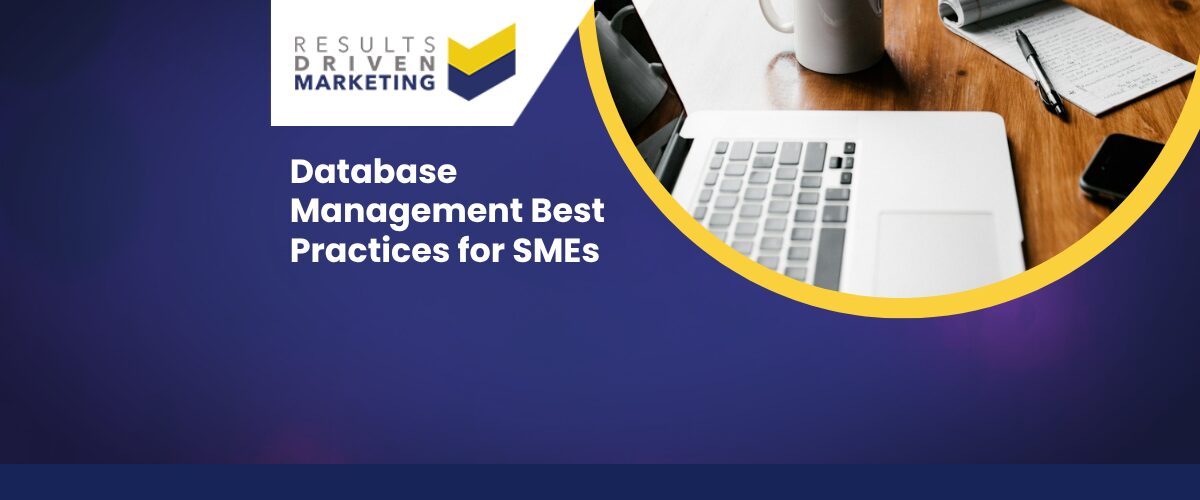
Database Management Best Practices for SMEs
Database management best practices are vital for SMEs that rely on purchased B2B marketing data to drive sales and growth. Without proper care, your database can quickly become a source of frustration rather than opportunity — leading to wasted marketing spend, low response rates, and potential compliance risks. Many small and medium businesses fall into the trap of buying data once and forgetting about it, only to find their campaigns failing due to outdated or irrelevant contacts.
In this post, we’ll break down simple, practical steps you can take to keep your data clean, accurate, and compliant. From regular cleansing to smart segmentation, these best practices will help you reach the right people, boost your ROI, and avoid common pitfalls. We’ll also share how working with Results Driven Marketing can give you the confidence that your data is always helping — not hindering — your success.
Why SMEs Need Good Database Management
Database management best practices aren’t just for large enterprises — they’re critical for SMEs too. Without a clean, well-managed database, your sales and marketing teams can end up wasting time chasing dead leads, dialling wrong numbers, or sending emails that bounce. Every outdated or inaccurate record chips away at your ROI, and for smaller businesses, that impact is felt even more sharply.
Let’s be honest — bad data leads to:
-
Missed opportunities – because your message isn’t reaching the right decision-makers
-
Wasted time and budget – on calls, emails, and mailings that go nowhere
-
Compliance risks – including GDPR breaches or CTPS complaints that could cost you
On the flip side, SMEs that prioritise good database management see better targeting, stronger response rates, and more confident outreach. It’s one of the simplest ways to give your marketing efforts a real edge.
Essential Database Management Best Practices
Database management best practices give SMEs the foundation for more effective and compliant marketing. Here are the key areas to focus on:
Keep Your Data Clean and Up to Date
A clean database means fewer wasted calls, fewer bounced emails, and more time spent speaking to the right people.
-
Regularly check your data for outdated records, duplicates, and invalid contacts.
-
Make data cleansing part of your routine, not just a one-off task.
-
Aim for accuracy so your team can focus on selling, not sorting.
Prioritise GDPR and CTPS Compliance
Compliance isn’t optional — it’s essential to protect your business.
-
Always ensure your data is sourced and used in line with GDPR rules.
-
Check your phone marketing data against the CTPS register before calling.
-
Remember: the cost of non-compliance is far higher than the cost of good data management.
Segment Your Data for Better Targeting
The more relevant your outreach, the better your results.
-
Break down your lists by sector, decision-maker type, company size or region.
-
Tailor your campaigns to suit different segments — it’s proven to improve engagement.
-
Align your data with how you market (email, telemarketing, or direct mail).
If you’re looking for targeted data for your next campaign, take a look at our email lists.
Ensure Consistency Across Platforms
Data stored in multiple places often leads to mistakes and confusion.
-
Keep your CRM, marketing tools, and sales records in sync.
-
Make sure any updates flow through all your systems so nothing gets missed.
How Often Should SMEs Review Their Data?
One of the most overlooked database management best practices is setting a regular review schedule. Even the best B2B marketing lists can become outdated over time — decision-makers move on, companies change focus, and contact details shift.
So, how often should SMEs review their data?
-
Every 3–6 months: This helps catch changes early and keep your campaigns sharp.
-
After major campaigns: If a marketing push underperforms, your data could be part of the problem — review it before trying again.
-
Before launching new products or services: Make sure your targeting aligns with your updated offer.
-
Whenever you notice rising bounce rates or call failures: A clear sign it’s time for a data health check.
Consistent reviews not only protect your ROI — they also keep you on the right side of compliance.
Why Choose Results Driven Marketing
At Results Driven Marketing, we understand how critical accurate, high-quality data is for SMEs. That’s why we go beyond simply supplying B2B marketing lists — we provide support and advice to help your campaigns succeed.
Here’s what sets us apart:
-
Accurate marketing lists tailored to your needs – from 2,000+ sectors, matched to your preferred marketing style (email, telemarketing, or direct mail).
-
Data that meets industry standards for accuracy – with replacements offered if accuracy benchmarks aren’t met.
-
Compliance built in – we ensure all data supplied is GDPR and CTPS checked where relevant.
-
Fast delivery and personal service – password-protected files, usually within 24 hours, and friendly advice whenever you need it.
We help SMEs go from bad data to more customers and profits — without the hassle.
Next Steps — Take Control of Your Marketing Data
Database management best practices are easy to overlook, but getting them right can transform your marketing results. The good news? You don’t need complex systems or huge budgets — just a clear plan and the right data partner.
Here’s what you can do today:
-
Review your current database – when was it last cleansed or checked for compliance?
-
Set a regular schedule for data reviews, whether quarterly or after major campaigns.
-
Consider partnering with a trusted supplier like Results Driven Marketing to ensure your data works for you, not against you.
Ready to improve your marketing data? Contact us for a free data review or custom quote.
Results Driven Marketing
📞 0191 406 6399
🌐 rdmarketing.co.uk
Helping UK SMEs get accurate marketing lists for better results — tailored to your marketing style, and always compliant.





